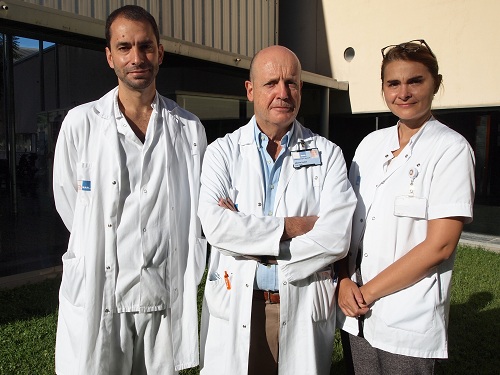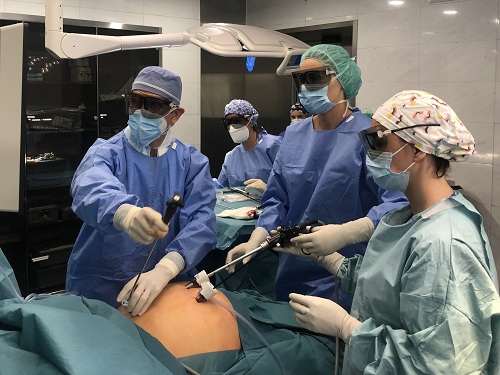
People suffering from morbid obesity, but who do not have additional comorbidities such as cholesterol or fatty liver disease, known as metabolically healthy obese patients, maintain the long-term benefits of undergoing bariatric surgery. This has been demonstrated by a study that analysed data from almost 200 patients with severe obesity who underwent bariatric surgery at Hospital del Mar. The study was carried out by researchers from the hospital's Endocrinology and Nutrition Service and the Hospital del Mar Medical Research Institute (IMIM), together with the Autonomous University of Barcelona and the CIBER on the Physiopathology of Obesity and Nutrition (CIBEROBN). It has been published in the journal Surgery for Obesity and Related Diseases. The same researchers had already published an initial study in which they analysed the evolution of these patients at one year. This new study is the first of its kind in Spain.
The researchers analysed the five-year evolution of around 200 patients who underwent bariatric surgery at Hospital del Mar. Prior to the operation, one in five of these people had no obesity-related comorbidities, meaning they were people with severe obesity who were metabolically healthy. The rest had at least one, either diabetes, dyslipidaemia (high blood levels of cholesterol and/or triglycerides), hypertension or fatty liver disease. The results indicate that both groups benefit from surgery and that this improved over the study period.

From left to right, David Benaiges, Albert Goday and Anna Casajoana.
Decrease in all indicators
In patients who were healthy before the surgery, all of the indicators analysed were still improved five years later. This was seen for blood glucose levels, which decreased by 7%, and triglycerides, which decreased by 31%. Two of the fatty liver markers also dropped, by 29% and 55%. In contrast, HDL cholesterol levels, the so-called good cholesterol, rose by 37%. This data led Dr. Albert Goday, first author of the study and head of the Endocrinology and Nutrition Department, to state that "Many of the metabolic improvements achieved with bariatric surgery had been demonstrated in the short term, but what we have now shown is that this is not a transitory improvement, but a long-term reality, since after five years the patients are still improving." This is significant, as we now know that, although within the normal range, if we manage to reduce the level of glucose in the blood, blood pressure, low density cholesterol (LDL) or fatty liver indicators, the risk of suffering from cardiovascular diseases also goes down.

Bariatric surgery intervention
The data demonstrates the suitability of this type of surgery for obese patients who have no comorbidities. "Even though they are healthy, they improve, and that is important, because we know that it is only a matter of time before these patients become metabolically ill. We see that at five years they are not sick but have improved compared to their initial state", says Dr David Benaiges, a consultant in the same department and the final author of this study. This could lead to a change in the current criteria for inclusion in bariatric surgery procedures to admit people with a lower body mass index than currently accepted, as this would prevent their condition from degrading prior to surgery. At the moment, patients with obesity and metabolic syndrome are only included if they have a body mass index of more than 40kg/m2.
In patients who did have comorbidities before undergoing surgery, the study shows that they maintained and increased the short-term benefits, with many (three out of four) actually becoming metabolically healthy and reversing the pathologies associated with overweight. Their blood glucose levels fell by 25%, while their triglyceride levels dropped by 37%. The two fatty liver markers went down, by 32% and 28%, while HDL cholesterol rose by 42%. "Clearly, it is very important for a person with obesity, even if they are in the metabolically healthy category, to try to change their lifestyle ", explains Dr. Goday. "We have shown this in patients undergoing bariatric surgery, but surely, with lesser degrees of intervention, with small lifestyle improvements, these parameters will improve, as will the risk of developing the associated diseases", he adds.
Reference article
A Goday, H Julià, A de Vargas-Machuca, J Pedro-Botet, S Benavente, JM Ramon, M Pera, A Casajoana, M Villatoro, L Fontané, M Bisbe, E Climent, O Castañer, JA Flores-Le Roux, D. Benaiges. Bariatric Surgery Improves Metabolic and Non-Alcoholic Fatty Liver Disease Markers in Metabolically Healthy but Morbidly Obese Patients At 5 Years. Surgery for Obesity and Related Diseases 2021. DOI: 10.1016/j.soard.2021.07.021. ISSN: 1550-7289.
© Institut Hospital del Mar
d'Investigacions MèdiquesLegal Notice and Privacy Policy | Cookie Policy | Site Index | Accessibility | Find Us | Contact